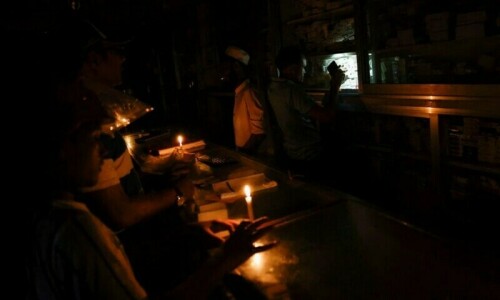WASHINGTON, June 17: By reversing himself on North Korea’s tainted accounts in a Macau-based bank, US President George W. Bush proved he was willing to go the extra mile for a nuclear deal with Pyongyang.
But success remains elusive, and the big question for the North Koreans remains whether “there really is a shift in US policy in dealing with them, or just a tactical shift to help the administration climb out of a political hole,” said Robert Carlin, a former CIA and State Department analyst on North Korea.
With the dispute over the accounts near resolution, the United States hoped that the isolated Communist state, having run out of excuses, would finally begin to implement a Feb 13 agreement to shut down its main nuclear reactor at Yongbyon.
The aging facility has been out of service three times for maintenance since April, including since June 11, US officials say.
On Saturday North Korean news agency KCNA reported the country had invited UN inspectors to discuss verifying and monitoring “the suspension of the operations of nuclear facilities”.
This is an initial key step promised under the February accord, which aimed to have Pyongyang shutter the reactor by mid-April in return for 50,000 tons of fuel oil.
But North Korea refused to act until it received $25 million frozen in Macau’s Banco Delta Asia after the US Treasury Department in 2005 charged the bank with laundering proceeds of Pyongyang’s illicit activities.
Given the long delay in resolving the issue, “you have to wonder if the North Koreans still see the world as they did” when the deal was reached, Carlin said.
In the interim, “they may have concluded that Chris Hill can’t snap his fingers and make things happen in Washington, that there are still going to be problems in getting Americans to deliver, and therefore they are not obligated to provide the maximum under the deal,” he said, referring to the chief US negotiator.
Michael Green, a former Bush Asia adviser with the Center for Strategic and International Studies, said he was encouraged that six-country talks on more far-reaching aspects of the February accord could resume.
But he worries that “we now have, in some ways, a harder position vis-a-vis the North Koreans than before because they’ve probably taken the lesson that we’re not going to put pressure on them if they delay and – quite the opposite – we’re going to be accommodating.”
Although Treasury officials long insisted they could not endorse releasing the accounts until North Korea and the BDA bank changed their ways, they went along when Bush, urged by Secretary of State Condoleezza Rice and Hill, backed the Feb 13 accord.
Even though US officials still link much of the money to illicit activities, the administration gave a green light for Macau to release it to North Korea. Hill has argued that the chance of persuading Pyongyang to abandon its nuclear capabilities should not falter on $25 million.
But Pyongyang refused to take the funds in cash because it wanted assurances it could make transfers through the international system. The US Treasury’s action had ramifications far beyond BDA, effectively ostracising Pyongyang from the world banking system.
When several banks refused to handle the tainted funds fearing it would compromise their integrity, Washington reversed itself again and facilitated the transfer, channelling the money through the US Federal Reserve Bank and a Russian bank.
Bush, long known for a visceral dislike of North Korean leaders, had grown increasingly frustrated that Pyongyang used the dispute to delay the agreement.
His conservative supporters detest the deal and in recent months, Bush voiced displeasure with Rice and Treasury Secretary Henry Paulson for putting him in a position of making commitments to Pyongyang that he found distasteful, US officials and diplomats said.
But with policies towards Iraq, Iran and the Israeli-Palestinian conflict in serious trouble, Bush and Rice are desperate for success as his presidency winds down.—Reuters














































Dear visitor, the comments section is undergoing an overhaul and will return soon.